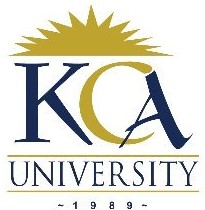 UNIVERSITY EXAMINATIONS: 2011/2012
UNIVERSITY EXAMINATIONS: 2011/2012
YEAR II EXAMINATION FOR THE BACHELOR OF SCIENCE IN
INFORMATION TECHNOLOGY
BIT 2205 NETWORK SYSTEMS ADMINISTRATION
DATE: APRIL 2012 TIME: 2 HOURS
INSTRUCTIONS: Answer Question One and Any other Two Questions
QUESTION ONE
a)Answer the following short questions:
i. What does a switch do if a frame arrives and the destination MAC address is not in its
MAC address table? (1 Mark)
ii. What does a switch do with a broadcast frame? (1 Mark)
iii. You replace a hub with a layer 2 switch. How does this affect collision domains? (2Marks)
iv. You replace a hub with a layer 2 switch. How does this affect broadcast domains? (1 Mark)
v. Why do routers typically add more latency than switches? (2 Marks)
b) Given the choices below, which address represents a unicast address? Explain why you have
discarded the others. (6 Marks)
A. 224.1.5.2, B. FFFF. FFFF. FFFF C. 192.168.24.59/30 D. 255.255.255.255
E. 172.31.128.255/18
c) Briefly describe the four parts of the OSI model for network management. (4 Marks)
d) Give the functions or applications of the following network troubleshooting commands
i. hostname (1 Mark)
ii. ipconfig /all (1 Mark)
iii. ping (1 Mark)
iv. tracert (1 Mark)
v. nslookup (1 Mark)
e) Discuss briefly any four items that should be addressed by security policies. (4 Marks)
f) Explain the considerations given in the placement of servers. (4 Marks)
QUESTION TWO
a)Differentiate between a client/server network and a server–based network. (4 Marks)
b) One of the best ways to understand how to build a network is to understand the method in
which traffic is passed across the network. One of the reasons the OSI model was created was
to help you understand how a network operates.
i. Which three devices operate at all seven layers of the OSI model? (3 Marks)
ii. What is one benefit of using a hierarchical addressing framework? (2 Marks)
c) Your company is concerned about Security on your network. Each department has its own file
server and the company also has an enterprise server that is shared by all departments. The
accounting department is concerned about the accounting information being accessible from
the other departments.
i. What can you as the network administrator use to control the information so that it’s not
being passed between the departments? (2 Marks)
ii. Discuss why it is necessary to consider the concept of Network Continuity when
designing a LAN, (3 Marks)
iii. Discuss the concept of disaster recovery (3 Marks)
d) Explain how a Redirector operates (3 Marks)
QUESTION THREE
a)Discuss three cases that necessitate static routing. (6 Marks)
b) The path determination function is the process of how the router determines which path to use
when forwarding a packet. To determine the best path, the router searches its routing table for a
network address that matches the packet’s destination IP address. One of three path
determinations results from this search. Discuss each one of them. (6 Marks)
c) Discuss why wireless LANs have become very popular. (6 Marks)
d) Differentiate between distance-vector and link-state protocols (2 Marks)
QUESTION FOUR
a)Explain any three costs that can be attributed to poor cabling: (6 Marks)
b)Explain briefly any five driving forces that necessitate network management. (5 Marks)
c)Describe four guidelines for creating effective network documentation (4 Marks)
d)Define the following terminologies as used in computer networks:
i. Metropolitan Area Network (MAN) (1 Mark)
ii. Virtual Private Network (VPN) (1 Mark)
iii. Throughput (1 Mark)
iv. Packet (1 Mark)
v. Digital bandwidth (1 Mark)
QUESTION FIVE
a)Discuss the benefits of the teleworker services. (6 Marks)
b) A VPN is an encrypted connection between private networks over a public network such as the
Internet. Instead of using a dedicated Layer 2 connection such as a leased line, a VPN uses
virtual connections called VPN tunnels, which are routed through the Internet from the private
network of the company to the remote site or employee host. Explain any three benefits of
VPNs. (6 Marks)
c) Troubleshooting Layer 2 problems can be a challenging process. The configuration and
operation of these protocols are critical to creating a functional, well-tuned network.Data Link
layer problems cause common symptoms that assist in identifying Layer 2 issues. Recognizing
these symptoms helps narrow down the number of possible causes. Discuss the common
symptoms of network problems at the Data Link layer. (6 Marks)
d) Describe briefly the function of a protocol analyzer. (2 Marks)
